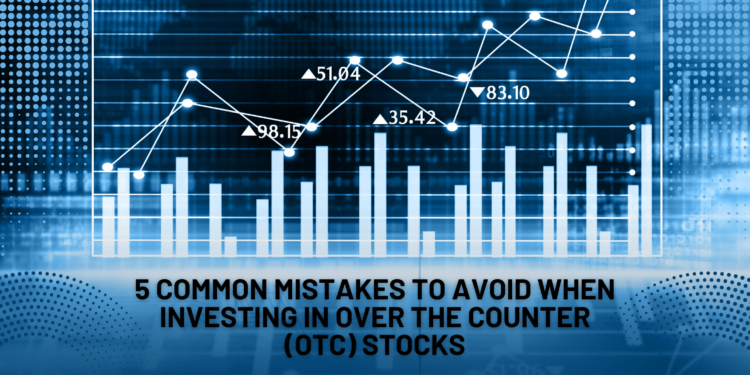5 Common Mistakes to Avoid When Investing in Over the Counter (OTC) Stocks
Introduction:
Over the counter (OTC) stocks are securities that are not listed on a major stock exchange. They are traded through a decentralized network of broker-dealers rather than a centralized exchange. As a result, investing in OTC stocks can be more challenging than investing in stocks that trade on a major exchange. Check out our comprehensive guide here: Breaking Down the World of Over-the-Counter Stocks: A Comprehensive Guide.
In this blog post, we will discuss 5 common mistakes that investors make when investing in OTC stocks and how to avoid them.
- Not Conducting Thorough Research Before Investing in an OTC Stock: One of the biggest mistakes that investors make when investing in OTC stocks is failing to conduct thorough research before investing. Due to the lack of regulation and transparency in the OTC market, it can be difficult to obtain reliable information about OTC stocks. Investors should conduct extensive research before investing in an OTC stock, including analyzing financial statements, reviewing the company’s business model, and researching the company’s management team. It is important to look for red flags such as a history of regulatory violations or negative news coverage.
- Focusing Solely on a Stock’s Price Instead of Its Underlying Fundamentals: Another mistake that investors make when investing in OTC stocks is focusing solely on a stock’s price instead of its underlying fundamentals. Price volatility is common in the OTC market, and stocks can experience rapid price fluctuations in response to news or events. However, a stock’s price is not always a reliable indicator of its underlying value. Investors should focus on a company’s underlying fundamentals, such as revenue growth, profitability, and market share, when evaluating an OTC stock. This can help investors identify undervalued stocks and avoid stocks that are overvalued.
- Neglecting to Consider the Risks Associated with Investing in OTC Stocks: Investing in OTC stocks carries a unique set of risks that investors need to be aware of. For example, OTC stocks are often smaller companies with less financial stability than their larger counterparts. Additionally, the lack of regulation and oversight in the OTC market can make it more vulnerable to fraud and manipulation. Investors should be aware of these risks and invest only what they can afford to lose. It is also important to diversify your portfolio to mitigate risk.
- Failing to Diversify a Portfolio of OTC Stocks: Investors who focus solely on investing in OTC stocks without diversifying their portfolio are more likely to experience losses. OTC stocks are inherently riskier than stocks that trade on a major exchange, so investing in a single OTC stock can be very risky. Diversification can help reduce risk by spreading investments across different stocks and asset classes. Investors should consider investing in a mix of OTC and traditional stocks, bonds, and other asset classes to help manage risk.
- Getting Caught up in the Hype Surrounding OTC Stocks and Making Emotional Decisions: Finally, investors can make the mistake of getting caught up in the hype surrounding OTC stocks and making emotional investment decisions. Social media platforms such as Twitter and Reddit can amplify the hype around certain stocks, which can lead to irrational investment decisions. It is important to stay objective when evaluating an OTC stock and to avoid making investment decisions based on emotions. Investors should base their decisions on reliable information and objective analysis.
Conclusion: Investing in over the counter (OTC) stocks can be more challenging than investing in stocks that trade on a major exchange. Investors need to be aware of the unique risks and opportunities associated with the OTC market and take steps to avoid common mistakes. By conducting thorough research, focusing on a stock’s underlying fundamentals, considering the risks, diversifying their portfolio, and avoiding emotional decisions, investors can improve their chances.
Sources:
- Securities and Exchange Commission
- Jumpstart Our Business Startups (JOBS) Act
- Crowdfunding and the JOBS Act
- Peer-to-Peer Lending: An Alternative Investment Opportunity
Disclaimer: Stocks and specifically Over the counter OTC stocks are risky in general. For more post click Home page


















